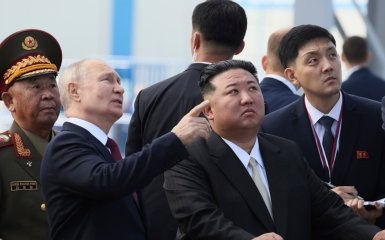According to information from the head of the Ministry of Defence of South Korea, Shin Won Sik, North Korea has sent about 7 thousand containers of ammunition and military equipment to Russia since last year.
What is known about the North Korean shipment of weapons to the Russian Federation
Representatives of the US and South Korea accused North Korea of sending artillery shells, missiles and other equipment to Russia.
However, Moscow and Pyongyang deny such accusations.
Officials from South Korea and independent analysts emphasize that in exchange for arms deliveries, North Korea probably received much-needed food, economic aid, and military aid to modernize its armed forces.
South Korea's defence minister said North Korea initially relied on ships but is now increasingly using rail to ship weapons to Russia across their land border.
According to the head of South Korea's Ministry of Defence, North Korea probably received more than 9,000 containers of food aid in exchange for military assistance to Russia.
He suspected that Russia could supply North Korea with fuel, contrary to the UN Security Council sanctions, which severely limit the country's import of oil and oil products.
Will Russia suffer enough losses to end the war against Ukraine?
According to Reuters journalists, Kremlin dictator Vladimir Putin currently has no reason to end the war of attrition against Ukraine.
It is noted that Russia will not suffer such losses that would force it to abandon the unleashed war against Ukraine.
The authors of the article emphasize that if the Western powers deprive Russia of crucial oil revenues, Putin could reconsider his position on the war against Ukraine. Still, it will be challenging to do so.
The publication notes that even if Russian oil revenues remain current, the Russian government will be forced to impose economic restrictions on its citizens.
The economy is overheating as Putin pours more money into the war effort.
Defence spending, projected at 10.8 trillion rubles ($118 billion) this year, has tripled since the start of the war. Inflation is 7.7%, and there is also an acute labour shortage.
At the same time, the central bank raised interest rates to 16% and said that the cost of official borrowing must remain high for a "prolonged period" to bring inflation down to its 4% target.
The government introduced capital controls to support the ruble.
The government will also need to take fiscal measures to bring domestic consumption in line with output. The first measures are likely to be tax increases aimed at wealthier individuals and companies. Putin has already made it clear, the publication says.
Putin boasts about the growth of the Russian economy, but the deeper picture is not so cheerful.
The government protected the population from the war's economic costs by using the National Welfare Fund to finance the budget deficit, which was 3.7% last year.
However, this is not sustainable, as the fund's liquid assets have fallen by more than half since Putin invaded Ukraine two years ago and now represent just 2.7% of national income.
One way or another, the military economy will crowd out non-military spending. This will happen through a combination of tax increases, inflation, high interest rates and spending cuts. Moreover, the war harms Russia's medium-term prospects. Western sanctions deprive it of access to advanced technologies... An additional burden for the economy is the outflow of young and educated people, the authors of the material predict.




